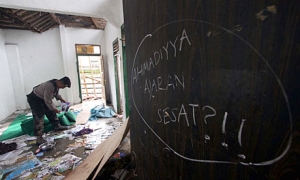Indonesian president condemns mob killing of Ahmadiyah Muslims
Footage shows three members of vilified Muslim group beaten to death after 1,500 people storm house during prayers
Associated Press in Jakarta guardian.co.uk, Monday 7 February 2011 18.03 GMT |

A policeman collects evidence from a house where Ahmadiyah members were attacked. The graffiti on the wall translates to “Ahmadiyah is a devient teaching”. Photograph: Nurani Nuutong/AFP/Getty Images
Indonesia’s president today ordered an investigation into an attack on members of a minority Muslim sect after a gruesome video emerged of a mob beating several victims to death with machetes, sticks and rocks.
About 1,500 people stormed a house in Banten province on Sunday to stop 20 Ahmadiyah followers from worshipping. They killed three men and badly wounded six others, while destroying the house and setting fire to several cars and motorbikes.
Indonesia is a secular country and has a long history of religious tolerance, but in recent years a hard line fringe has grown louder and the government – which relies on the support of Islamic parties in parliament – has been accused of caving in to it.
The attacks – which drew rare condemnation from President Susilo Bambang Yudhoyono – were captured on video and circulated widely on national television and the internet.
The most disturbing clip, posted on YouTube, showed assailants repeatedly pounding two victims – who appeared to be dead – with heavy sticks.
A policeman came to the scene but his screams of “stop” were almost inaudible among dozens who shouted “Allahu Akbar” or “God is great”.
The Ahmadiyah, thought to have 200,000 followers in Indonesia, are considered deviant by many Muslims and are banned in many Islamic countries because they believe that Muhammad was not the final prophet.
“I have ordered a comprehensive investigation to find out the real cause of the incident so that those guilty, or violating the law, can be penalised,” Yudhoyono told a news conference.
He also called on security forces as well as local governments to be proactive in taking action against the instigators of such violence. “Don’t wait until the conflicts and clashes have already happened,” he said.
Many attacks on religious minorities in recent years have been carried out by members of the Islamic Defenders Front. The hardline group pressured local authorities late last year to shutter a Christian church located in a densely populated Muslim area, and assailants stabbed a Christian worshipper and beat a minister on the head with a wooden plank as they headed to prayers.
Thirteen members of the Islamic Defenders Front have gone on trial in the case, and state prosecutors today sought a six-month prison term for Murhali Barda, a local group leader, for instigating the attack in September.
The Setara Institute for Peace and Democracy, a human rights group, says attacks on religious freedom by hardliners are steadily increasing. It says in 2010 there were 64 incidents, ranging from physical abuse to preventing groups from performing prayers and burning houses of worship, up from 18 in 2009 and 17 in 2008.
About 1,500 people stormed a house in Banten province on Sunday to stop 20 Ahmadiyah followers from worshipping. They killed three men and badly wounded six others, while destroying the house and setting fire to several cars and motorbikes.
Indonesia is a secular country and has a long history of religious tolerance, but in recent years a hard line fringe has grown louder and the government – which relies on the support of Islamic parties in parliament – has been accused of caving in to it.
The attacks – which drew rare condemnation from President Susilo Bambang Yudhoyono – were captured on video and circulated widely on national television and the internet.
The most disturbing clip, posted on YouTube, showed assailants repeatedly pounding two victims – who appeared to be dead – with heavy sticks.
A policeman came to the scene but his screams of “stop” were almost inaudible among dozens who shouted “Allahu Akbar” or “God is great”.
The Ahmadiyah, thought to have 200,000 followers in Indonesia, are considered deviant by many Muslims and are banned in many Islamic countries because they believe that Muhammad was not the final prophet.
“I have ordered a comprehensive investigation to find out the real cause of the incident so that those guilty, or violating the law, can be penalised,” Yudhoyono told a news conference.
He also called on security forces as well as local governments to be proactive in taking action against the instigators of such violence. “Don’t wait until the conflicts and clashes have already happened,” he said.
Many attacks on religious minorities in recent years have been carried out by members of the Islamic Defenders Front. The hardline group pressured local authorities late last year to shutter a Christian church located in a densely populated Muslim area, and assailants stabbed a Christian worshipper and beat a minister on the head with a wooden plank as they headed to prayers.
Thirteen members of the Islamic Defenders Front have gone on trial in the case, and state prosecutors today sought a six-month prison term for Murhali Barda, a local group leader, for instigating the attack in September.
The Setara Institute for Peace and Democracy, a human rights group, says attacks on religious freedom by hardliners are steadily increasing. It says in 2010 there were 64 incidents, ranging from physical abuse to preventing groups from performing prayers and burning houses of worship, up from 18 in 2009 and 17 in 2008.
© Guardian News and Media Limited 2011
URL: www.guardian.co.uk/world/2011/feb/07/...killed
URL: www.guardian.co.uk/world/2011/feb/07/...killed




